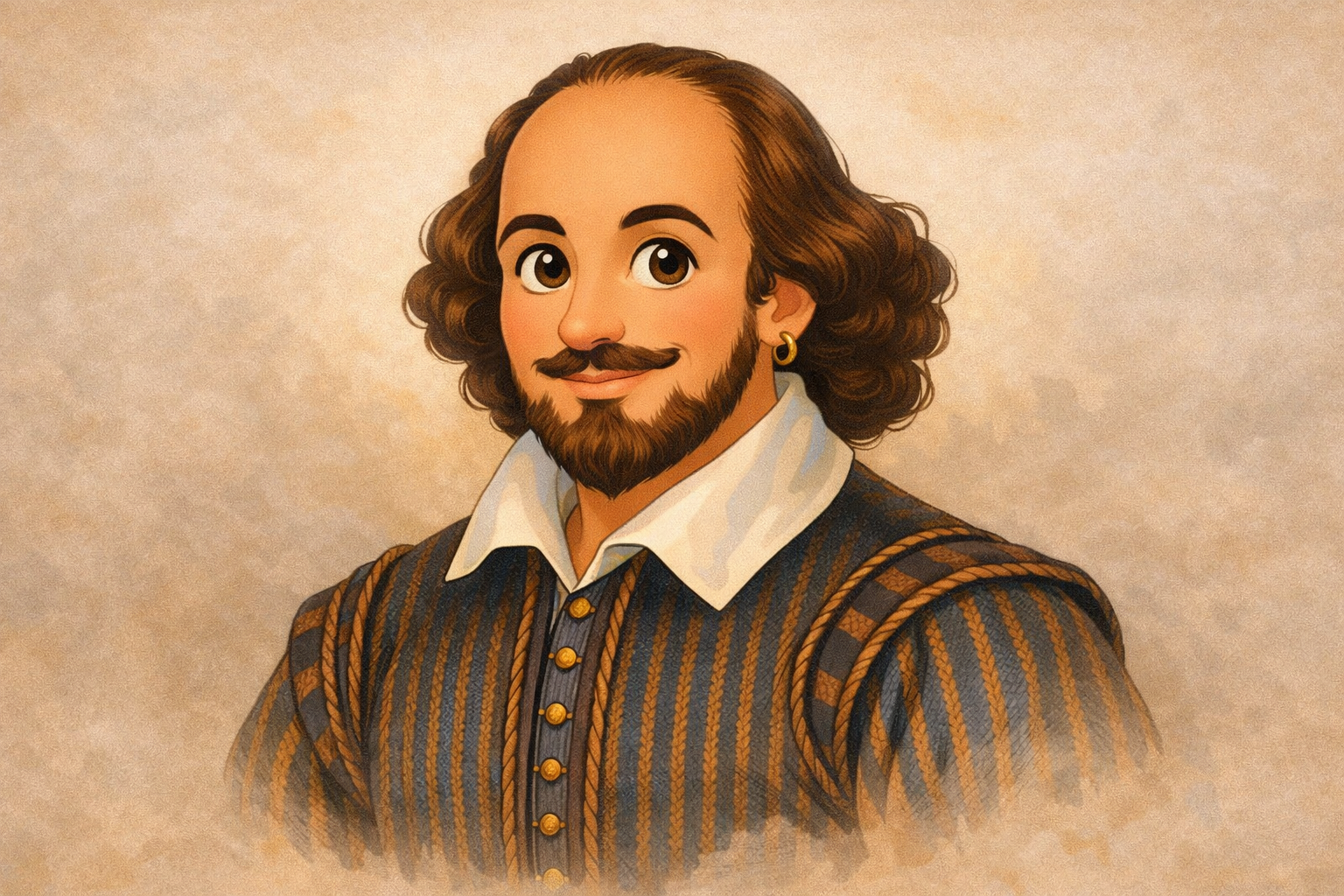William Shakespeare was born in April 1564 in the quiet market town of Stratford-upon-Avon, England — a place that would, centuries later, be forever etched on the map because of him. The exact day of his birth is uncertain, but tradition holds it to be April 23.
The son of John Shakespeare, a glove-maker and alderman, and Mary Arden, the daughter of a prosperous farmer, young William grew up in a home of modest means but rich in the rhythms of town life. His schooling at the local grammar school would immerse him in Latin, classical literature, and the tales of Ovid — seeds that would later flower into immortal poetry.
Although there are no records of his schooling, it is widely believed that Shakespeare attended the King’s New School in Stratford, where he would have received a solid education in Latin literature and classical texts.
The Disappearing Years
At 18, he married Anne Hathaway, who was eight years older, and soon became a father to Susanna, and later to twins, Hamnet and Judith. Hamnet died at the age of 11, a tragedy that may have influenced Shakespeare’s later work.
Then — silence. For nearly seven years, Shakespeare disappears from historical records.
Scholars call them the “Lost Years.” Did he travel? Act? Write? Was he a schoolmaster or a soldier? No one knows, but when he resurfaces, it is in London, and the stage is his kingdom.
The Playwright Ascends
By 1592, Shakespeare was making his mark as an actor and playwright. The theatres of London — from the Rose to the Theatre and later the iconic Globe — echoed with his words.
He gave the world comedies where wit danced like quicksilver (A Midsummer Night’s Dream, Much Ado About Nothing), tragedies that tore the heart open (Hamlet, Othello, King Lear, Macbeth), and histories that made kings breathe again (Henry V, Richard III).
“Some are born great, some achieve greatness, and some have greatness thrust upon them.”
His pen was both sword and sanctuary — capturing jealousy’s poison, love’s madness, ambition’s fall, and the fragile dignity of being human.
The Poet’s Touch
When the theatres closed during the plague of 1593, Shakespeare turned to poetry, producing the erotic Venus and Adonis and The Rape of Lucrece. His 154 sonnets would become a treasure of English literature, love letters to time, beauty, and mortality:
“Shall I compare thee to a summer’s day?
Thou art more lovely and more temperate.”
The Globe and Glory
By 1599, Shakespeare had become part-owner of the Globe Theatre — his plays now drew not only nobles in silks but also the “groundlings” who stood for a penny, drinking in the magic.
In 1603, King James I became his patron, and Shakespeare’s company was renamed The King’s Men.
Final Curtain
After two decades in London, Shakespeare retired to Stratford, having amassed wealth and fame rare for a writer of his time. He died on April 23, 1616, at the age of 52. In the Holy Trinity Church where he was buried, his grave bears the warning:
“Blessed be the man that spares these stones,
And cursed be he that moves my bones.”
The Eternal Bard
Over 400 years later, his words still live — whispered by lovers, thundered by actors, studied by scholars, and sung by schoolchildren. He gave us not just stories, but mirrors to see ourselves.
“We are such stuff
As dreams are made on,
And our little life
Is rounded with a sleep.”
Shakespeare did not just write plays — he wrote the human soul. He is often called England’s national poet and the “Bard of Avon”.
Shall I compare thee to a summer’s day?
Shall I compare thee to a summer’s day?
Thou art more lovely and more temperate:
Rough winds do shake the darling buds of May,
And summer’s lease hath all too short a date;
Sometime too hot the eye of heaven shines,
And often is his gold complexion dimm’d;
And every fair from fair sometime declines,
By chance or nature’s changing course untrimm’d;
But thy eternal summer shall not fade,
Nor lose possession of that fair thou ow’st;
Nor shall death brag thou wander’st in his shade,
When in eternal lines to time thou grow’st:
So long as men can breathe or eyes can see,
So long lives this, and this gives life to thee.
All the world’s a stage
All the world’s a stage,
And all the men and women merely players;
They have their exits and their entrances,
And one man in his time plays many parts,
His acts being seven ages. At first, the infant,
Mewling and puking in the nurse’s arms.
Then the whining schoolboy, with his satchel
And shining morning face, creeping like snail
Unwillingly to school. And then the lover,
Sighing like furnace, with a woeful ballad
Made to his mistress’ eyebrow. Then a soldier,
Full of strange oaths and bearded like the pard,
Jealous in honor, sudden and quick in quarrel,
Seeking the bubble reputation
Even in the cannon’s mouth. And then the justice,
In fair round belly with good capon lined,
With eyes severe and beard of formal cut,
Full of wise saws and modern instances;
And so he plays his part. The sixth age shifts
Into the lean and slippered pantaloon,
With spectacles on nose and pouch on side;
His youthful hose, well saved, a world too wide
For his shrunk shank, and his big manly voice,
Turning again toward childish treble, pipes
And whistles in his sound. Last scene of all,
That ends this strange eventful history,
Is second childishness and mere oblivion,
Sans teeth, sans eyes, sans taste, sans everything.
